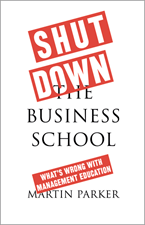
Martin Parker.
Pluto Press 2019; 198 pp;
ISBN: 978-0-74539-916-4.
By Len Findlay
The author of this self-styled “polemic” is an eminent figure in management studies in the United Kingdom. His is very much an insider’s challenge to what he takes to be a pseudo-discipline both intellectually mediocre and socially damaging. However, it is a challenge that offers an alternative to management (namely, “organization”) after spirited and frequently hilarious criticism of the status quo in business schools in “the Global North.”
Parker has gathered some of his most incisive sallies here, effectively sequenced and supplemented them, and begun to clear a path beyond market monoculturalism and the fancy new, named buildings on campuses everywhere that house its hyped, haunted and overpaid adherents. For anyone who works at a managed university or college — and who among us doesn’t — this book will pour salt in the Canadian academy’s self-inflicted and externally induced wounds while inviting us to think of a world that once was and can again be free of business schools and the irresponsible tripe they mostly purvey.
The first half of this book is concerned with the linguistic, institutional and disciplinary history of “management.” Parker draws on an impressive range of historical, philosophic and semantic work in order to distinguish himself from jargon-prone, faux-critical colleagues with whom he has had to share various academic locations. One can commend and profit from this rare contextualizing effort even while regretting his resort to laundry lists and connections that deserve more sober and sustained exposition than he accords them.
For Parker, it is the emergence and current ascendancy of the term “management” and its cognates in business schools that most tellingly charts their unrivalled attractiveness to private donors and ill-advised governments. While business schools have never had it so good in terms of donor buy-in, the edifice complex, student enrolments, social licence and all that these developments can “leverage,” many other disciplines and schools suffer the indignities (and worse) of alleged irrelevance or inefficiency. Meanwhile, senior administrators thrive by embracing business models of communication, prioritization and compensation. As “the cuckoo in the nest,” management has displaced diversity and critique while offering protective coloration to academic managers who intensify their own private fears of inauthenticity and betrayal while mouthing the mantras of creative destruction and global competitiveness, and the banalities of “leadership” and “entrepreneurship.”
Parker offers organization as a potential antidote to the ills of managerialism and the principal reason why business schools as currently constituted can be safely “shutdown.” He favours organization as more inclusive, necessarily interdisciplinary, attuned to the extraordinary range of economic and civil society activities ignored or patronized in business schools as he understands them, and much more probably beneficial to students and academic staff alike. Rather than behaving as a supremely invasive species, managers and the proponents of managerialism can be reconnected to academic and other communities, bringing their skills and interests into more honest and robust conversation with disciplines where there are only multiple bottom lines or no bottom line at all. Business professors can then bring a provisional sense of parity and shared curiosity rather than the current mix of swagger and defensiveness to their interactions with colleagues.
For this reanimation of academic community and its nominal stewards, Parker looks to much greater “pluralism” and permeability, for a less radical but perhaps more ‘marketable’ version of change than an openly anti-capitalist agenda. A critical reading of Raymond Williams or the Frankfurt School theorists might have pushed Parker further and productively leftwards, but he is probably already in enough trouble in his home department and with colleagues in business schools across the Global North.
In the meantime, for a sharpened sense of the gap that needs to be bridged if the rot is to be halted and reversed, google Murray Edwards College, Cambridge, and then the petro-philanthropic N. Murray Edwards School of Business at the University of Saskatchewan, and ask yourself which model of post-secondary education and research you prefer, and why.
________________
Len Findlay is professor emeritus of English at the University of Saskatchewan.